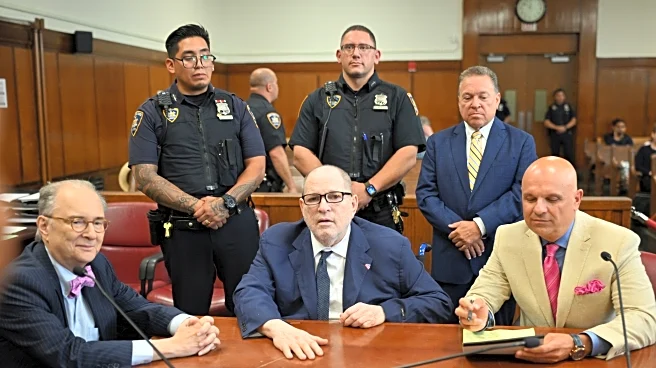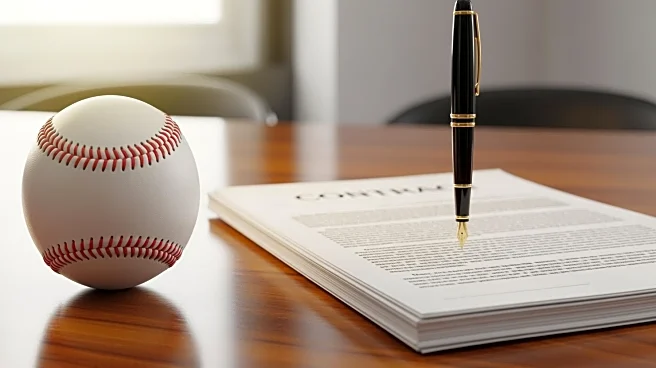NEW YORK (AP) — Prosecutors urged a judge on Wednesday to reject Harvey Weinstein ’s claims that his June sexual assault conviction was marred by threats and bullying among jurors.
The disgraced movie mogul’s
lawyers submitted sworn affidavits last month from two jurors who said they regretted voting to convict Weinstein and only did so because others on the panel bullied them during five contentious days of deliberations.
The Manhattan district attorney’s office said the jurors’ claims were “inconsistent and implausible” and that they provided no legal basis for Weinstein’s lawyers to challenge his conviction.
One juror who claimed in an affidavit that he observed “threats” and “intimidation” had told the judge during deliberations that he only saw “playground stuff," prosecutors said. Immediately after the trial ended, the same juror told reporters, “it’s not like a fight was going to break out. No, obviously not.”
Weinstein’s bid to overturn his first-degree criminal sex act conviction “utterly fails, on both the law and the facts, to meet the standard necessary to set aside the guilty verdict,” prosecutors Matthew Colangelo, Nicole Blumberg, Shannon Lucey and Becky Mangold wrote.
They cited a centuries-old rule that the U.S. Supreme Court has said gives “substantial protection to verdict finality” and assures that once a trial is over, jurors won’t be "harassed or annoyed by litigants seeking to challenge the verdict.”
Judge Curtis Farber said he'll rule on Dec. 22.
Prosecutors said they declined to interview any jurors before responding to the defense’s claims because doing so would “cause the very harms” the centuries-old rule was meant to avoid.
Weinstein’s defense team, led by attorney Arthur Aidala, argued in court papers last month that the verdict was marred by “threats, intimidation, and extraneous bias,” and that Farber failed to properly deal with it at the time.
The two jurors said in their affidavits that they felt overwhelmed and intimidated by others on the panel who wanted to convict Weinstein on the criminal sex act charge, which accused him of forcing oral sex on TV and film production assistant and producer Miriam Haley in 2006.
One of the jurors said she was screamed at in the jury room and told, “we have to get rid of you.” The other juror said anyone who doubted Weinstein’s guilt was grilled by other jurors and that if he could have voted by secret ballot, “I would have returned a not guilty verdict on all three charges.”
“I regret the verdict,” that juror said. “Without the intimidation from other jurors, I believe that the jury would have hung on the Miriam Haley charge.”
Weinstein, 73, was acquitted on a second criminal sex act charge involving a different woman, Polish psychotherapist and former model Kaja Sokola. The judge declared a mistrial on the final charge, alleging Weinstein raped former actor Jessica Mann, after the jury foreperson declined to deliberate further.
It was the second time the Oscar-winning producer was tried on some of the charges. His 2020 conviction, a watershed moment for the # MeToo movement, was overturned last year. In addition to seeking to overturn his June conviction, Weinstein’s lawyers are also fighting to avoid yet another retrial on the undecided count.
Weinstein denies all of the charges. The first-degree criminal sex act conviction carries the potential for up to 25 years in prison, while the unresolved third-degree rape charge is punishable by up to four years — less than he already has served.
The Oscar-winning producer has been behind bars since his initial conviction in 2020, and he later also was sentenced to prison in a separate California case, which he is appealing.
Some of what the two jurors said in their affidavits echoed acrimony that spilled into public view during deliberations.
As jurors weighed charges for five days, one juror asked to be excused because he felt another was being treated unfairly. Later, the foreperson complained that other jurors were pushing people to change their minds and that a juror yelled at him for sticking to his opinion and suggested the foreperson would “see me outside.”
When jurors came forward with concerns, Farber was strict about respecting the sanctity of deliberations and cautioned them not to discuss the content or tenor of jury room discussions, transcripts show.
As deliberations were on, Farber reminded jurors that “tension and conflict” is normal in the deliberative process.
In their affidavits, the two jurors said they didn’t feel the judge was willing to listen to their concerns.
When jurors were asked if they agreed with the guilty verdict, one of the jurors noted in her affidavit that she paused “to try and indicate my discomfort in the verdict.”
Afterward, when Farber spoke with jurors, she said she told him, “the deliberations were unprofessional.”









